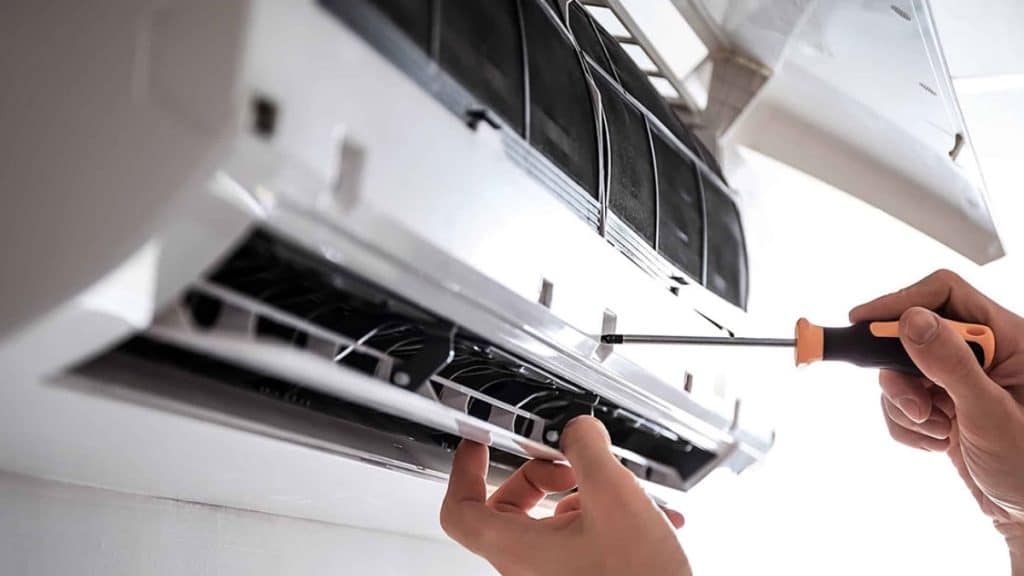Regular maintenance and prompt repairs can help your air conditioner (AC) work efficiently. In turn, an efficient AC can help you save money on your energy bill and prevent more expensive repairs. With a top AC repair contractor like Central Air Heating, Cooling & Plumbing, you can get the professional help you need. While some repairs can be managed on your own, you never want to risk your safety or your AC’s physical integrity by performing DIY repairs.
Understanding Your AC System: Key Components and Their Roles
Your AC system consists of a thermostat, a condenser coil, refrigerant lines, filters, an evaporator coil, a compressor, and other components. Each one of these components is necessary for your AC to work its best. When your AC is properly maintained, it can last for 15 to 20 years.
At their heart, air conditioners work by transferring heat energy. Refrigerants are able to absorb heat from inside your home. With the help of the condenser coils and compressor, the refrigerant is able to release the heat outside before returning for another cycle.
Common AC Problems You Can Fix Yourself
There are a few basic problems you can fix on your own to keep your AC running at its best. For instance, a dirty air filter is known to decrease energy efficiency by 5% to 15%. By simply changing your air filter every one to three months, you can save a significant amount on your energy bill.
To keep your heating, ventilation, and air conditioning (HVAC) unit working its best, try performing some of the following DIY AC repair tasks.
- Check for tripped circuit breakers: If a circuit breaker becomes tripped, your AC will stop running. All you have to do is check for the tripped breaker and switch it on again. However, if it trips again, you need to get professional AC repair because there is an underlying issue that is causing this problem to keep happening.
- Replace your filter: Each manufacturer has different specifications, so follow the rules for your AC. In general, you will need to change or clean the air filter every 30 to 90 days.
- Reset the thermostat: If your AC isn’t reaching the appropriate temperature, something may be wrong with your thermostat. Follow the manufacturer’s instructions to reset the thermostat.
- Clean debris around your outdoor unit: Keep 2 to 3 feet of space clear around your outdoor unit. Weed and remove any debris regularly.
When To Call an AC Repair Contractor
Even with the best DIY AC repair, there are common AC problems that require professional help. If you notice any of the following issues, it’s important to get help right away to avoid additional damage or safety risks. Additionally, performing DIY repairs can void your warranty, so it’s important to call an AC repair contractor if you notice the following problems.
- Compressor problems
- Low refrigerant levels
- Warm air or low airflow
- Frozen coils
- Strange noises
- Water leaks
- Unusual smells
The Risks of DIY AC Repairs
Getting the right air conditioning repair tips and services is important because attempting DIY AC repairs can be dangerous. Depending on the repair, you may be dealing with some of the following risks.
- Electrical injuries or electrocutions
- Voided warranties
- Damaged AC components
- More expensive repairs in the future
How Central Air Heating, Cooling & Plumbing Can Help
If you try to do AC troubleshooting and repairs on your own, it may cause more damage to your AC. This can lead to costly repairs in the future. Often, it is much cheaper to simply reach out to a professional AC repair company in the beginning.
A reputable company, like Central Air Heating, Cooling & Plumbing, can help you quickly diagnose and repair the issue. Plus, Central Air has experience with routine maintenance and emergency repairs.
Get Professional Help With Your AC Repairs
While there are some DIY AC repairs you can handle on your own, it’s essential to understand when you should reach out for expert help. By working with an AC repair contractor, you can prevent electrical injuries, avoid additional damage, and enjoy having a more efficient AC.

